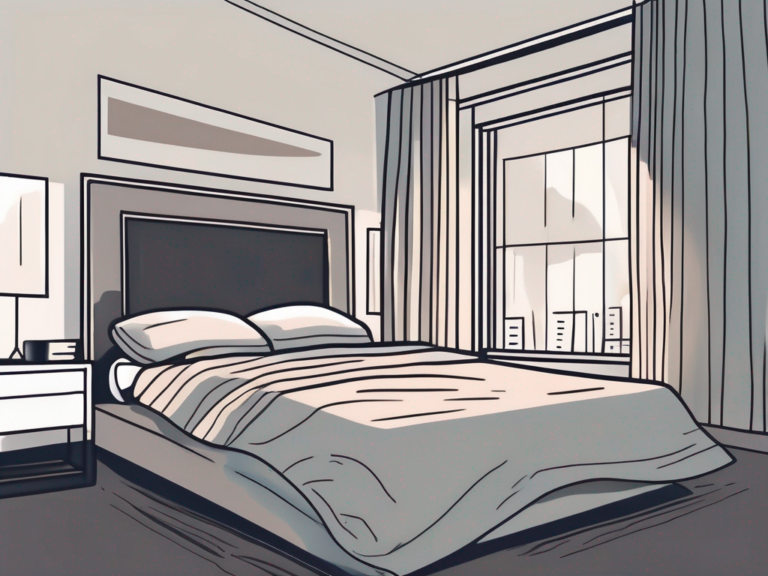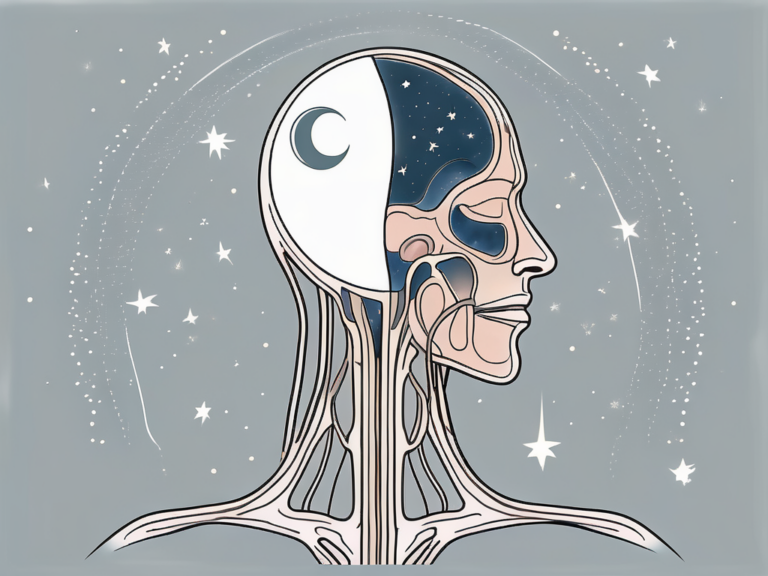Accessory Nerve and Sleeping
Sleep plays a vital role in our overall well-being and functioning. It is during sleep that our body repairs itself, memories are consolidated, and the mind rejuvenates. While many factors contribute to a good night’s sleep, one often overlooked player is the accessory nerve. In this article, we will explore the intriguing connection between the accessory nerve and sleep, the impact of accessory nerve damage on sleep, and the relationship between sleep disorders and this important nerve.
Understanding the Accessory Nerve
The accessory nerve, also known as the eleventh cranial nerve, has long been recognized for its role in motor functions, particularly controlling the movements of the neck and shoulders. However, recent scientific research has shed light on its involvement in sleep regulation.
Furthermore, the accessory nerve plays a crucial role in maintaining proper posture and head positioning. It helps stabilize the shoulders and neck during various activities, such as lifting objects or turning the head.
Anatomy of the Accessory Nerve
The accessory nerve is a complex structure that originates in the brainstem and extends down to the upper spinal cord. It is primarily composed of two branches: the cranial branch, which innervates the muscles in the throat and soft palate, and the spinal branch, responsible for controlling the muscles in the neck and shoulders.
The cranial branch of the accessory nerve is involved in swallowing and phonation, while the spinal branch plays a key role in shoulder movements, such as shrugging and rotating the shoulders.
Function of the Accessory Nerve
The primary function of the accessory nerve is to coordinate and regulate the movements of the neck and shoulders. It works in conjunction with other nerves and muscle groups to allow for smooth and coordinated movements.
In addition to its motor functions, the accessory nerve has been found to have an impact on certain respiratory functions. Studies have shown that dysfunction of the accessory nerve can lead to difficulties in breathing and speaking, highlighting its importance beyond just neck and shoulder movements.
The Role of the Accessory Nerve in Sleep
While the accessory nerve’s role in motor function is well-established, its involvement in sleep regulation is a relatively new area of exploration. Emerging research suggests that this nerve may contribute to the complex processes that occur during sleep.
Understanding the intricate relationship between the accessory nerve and sleep is crucial for unraveling the mysteries of our restorative rest. The accessory nerve, also known as cranial nerve XI, is a critical player in the neural orchestra that orchestrates our sleep-wake cycles and ensures the smooth performance of various sleep stages.
Accessory Nerve and Sleep Regulation
Studies have shown that the accessory nerve may play a role in regulating the stages of sleep. During REM sleep, for instance, the accessory nerve seems to facilitate the complex eye movements that occur. Additionally, disruptions in the accessory nerve’s functioning have been linked to changes in sleep architecture and sleep-wake cycles.
Moreover, recent investigations have hinted at the accessory nerve’s involvement in the coordination of respiratory patterns during sleep. This nerve’s influence extends beyond mere motor control, delving into the realm of autonomic functions that are essential for a restful night’s sleep.
Accessory Nerve and Sleep Disorders
Damage or dysfunction of the accessory nerve can have a profound impact on sleep. Individuals with accessory nerve-related sleep disorders may experience difficulties in falling asleep, maintaining sleep, and achieving restorative sleep. It is important to note that while the accessory nerve’s involvement in sleep disorders is an area of active research, more studies are needed to fully understand the mechanisms at play.
Furthermore, the accessory nerve’s potential role in sleep disorders opens up new avenues for therapeutic interventions. By targeting this neural pathway, researchers aim to develop innovative treatments that could alleviate the burden of sleep disturbances and enhance overall sleep quality for affected individuals.
The Science Behind Sleep and Nervous System
When we think of sleep, we often focus on the physical and mental aspects, but our nervous system plays a crucial role in regulating sleep as well. The intricate interplay between the nervous system and sleep is a fascinating area of study that continues to unveil new insights.
Understanding the connection between sleep and the nervous system involves delving into the complex mechanisms that govern our restorative rest. The nervous system, comprising the central and peripheral nervous systems, coordinates with various brain regions to initiate and maintain different sleep stages.
The Sleep Cycle and Nervous System
Within our nervous system, various regions and structures work together to orchestrate the sleep-wake cycle. The hypothalamus, for example, acts as the master regulator, releasing hormones that promote wakefulness and sleepiness. The brainstem, where the accessory nerve is located, helps coordinate the transitions between the different stages of sleep.
Moreover, the pineal gland, nestled deep within the brain, secretes melatonin in response to darkness, signaling the body that it’s time to sleep. This intricate dance of neurotransmitters and neural pathways ensures that our sleep cycles align with our internal body clock, known as the circadian rhythm.
How Nerves Influence Sleep Quality
Nerves, including the accessory nerve, send signals and information throughout the body. They play a critical role in transmitting sensory information, allowing us to react to our environment appropriately. Disruptions or abnormalities in the functioning of these nerves can impact sleep quality and contribute to sleep disorders.
Furthermore, the autonomic nervous system, responsible for regulating involuntary bodily functions such as heart rate and digestion, also influences our sleep patterns. The balance between the sympathetic and parasympathetic branches of the autonomic nervous system dictates whether we are in a state of arousal or relaxation, directly impacting the ease with which we fall asleep and the quality of our slumber.
The Impact of Accessory Nerve Damage on Sleep
An injury or damage to the accessory nerve can have significant consequences for sleep. Understanding the symptoms and seeking appropriate treatment and management strategies are crucial for individuals affected by accessory nerve damage.
Accessory nerve damage can disrupt the intricate network of nerves responsible for controlling various movements and functions in the body. This disruption can extend to the sleep cycle, leading to difficulties in falling asleep, staying asleep, or achieving restorative sleep. The discomfort and pain associated with accessory nerve damage can also exacerbate sleep disturbances, creating a cycle of sleep deprivation and physical discomfort.
Symptoms of Accessory Nerve Damage
The symptoms of accessory nerve damage can manifest in various ways, depending on the extent and location of the injury. Common symptoms include weakness or paralysis in the neck and shoulder muscles, difficulty moving the head or shrugging the shoulders, and muscle pain or stiffness.
In addition to the physical symptoms, individuals with accessory nerve damage may experience psychological effects such as anxiety and depression. The challenges of coping with a debilitating condition can take a toll on mental well-being, further impacting sleep quality and overall health.
Treatment and Management of Accessory Nerve Damage
When it comes to treating accessory nerve damage, the approach depends on the underlying cause and severity of the injury. Physical therapy, medication, and surgical interventions are among the potential treatment options. It is essential to consult with a healthcare professional to determine the most suitable course of action.
Furthermore, complementary therapies such as acupuncture, massage, and relaxation techniques may offer additional support in managing the symptoms of accessory nerve damage and improving sleep patterns. A holistic approach that addresses both the physical and emotional aspects of the condition can contribute to better outcomes and enhanced quality of life for individuals dealing with accessory nerve damage.
The Relationship Between Sleep Disorders and the Accessory Nerve
Sleep disorders are complex conditions that can have a multitude of underlying causes. While the connection between sleep disorders and the accessory nerve is still being explored, there are certain sleep disorders in which the involvement of this nerve seems to be particularly noteworthy.
Understanding the intricate relationship between sleep disorders and the accessory nerve involves delving into the physiological mechanisms at play. The accessory nerve, also known as cranial nerve XI, is a crucial component of the nervous system responsible for controlling specific muscles in the neck and upper back. Its role in motor function and coordination extends to various bodily functions, including those related to breathing and posture.
Sleep Apnea and Accessory Nerve
Sleep apnea, a common sleep disorder characterized by repeated interruptions in breathing during sleep, has been linked to accessory nerve dysfunction. The accessory nerve’s role in regulating the muscles involved in breathing may contribute to the development and progression of sleep apnea.
In individuals with sleep apnea, abnormalities in the accessory nerve’s function can disrupt the coordinated effort of respiratory muscles, leading to breathing irregularities during sleep. This dysfunction may manifest as obstructive sleep apnea, where the airway becomes partially or completely blocked, or central sleep apnea, characterized by the brain’s inability to send proper signals to the muscles that control breathing.
Insomnia and Accessory Nerve
Insomnia, the inability to fall asleep or stay asleep, can be associated with a range of factors. While the connection between the accessory nerve and insomnia is not yet fully understood, studies suggest that alterations in pain perception mediated by this nerve may contribute to the development of insomnia symptoms.
Research exploring the potential link between the accessory nerve and insomnia highlights the nerve’s involvement in transmitting sensory information related to discomfort or pain. It is hypothesized that heightened sensitivity or dysfunction in the accessory nerve pathways could influence an individual’s perception of pain, potentially leading to sleep disturbances such as difficulty initiating or maintaining sleep.
Future Research on Accessory Nerve and Sleep
As the field of neurology and sleep medicine continues to advance, researchers are actively investigating the role of the accessory nerve in sleep and exploring potential therapies for sleep disorders.
One area of future research focuses on the impact of accessory nerve dysfunction on sleep quality. Studies have shown that individuals with accessory nerve abnormalities may experience disruptions in their sleep patterns, leading to daytime fatigue and impaired cognitive function. By further examining the specific mechanisms through which the accessory nerve affects sleep, researchers hope to develop targeted interventions that can alleviate these symptoms and improve overall sleep quality.
Potential Therapies for Sleep Disorders
Researchers are exploring various treatment possibilities for sleep disorders associated with accessory nerve dysfunction. These include targeted nerve stimulation techniques, pharmacological interventions, and innovative therapies aimed at addressing the underlying causes of sleep disorders.
One promising avenue of research involves the use of non-invasive nerve stimulation techniques to modulate the activity of the accessory nerve. By precisely targeting the nerve pathways involved in sleep regulation, these techniques have the potential to restore normal sleep patterns and alleviate the symptoms of sleep disorders. Additionally, researchers are investigating the potential of novel pharmacological agents that can specifically target the accessory nerve, providing a more targeted and effective treatment approach.
The Future of Neurology and Sleep Medicine
The intricate relationship between sleep and the nervous system holds immense potential for improved healthcare and well-being. Continued research into the accessory nerve and its connection to sleep will undoubtedly contribute to advancements in neurology and sleep medicine, paving the way for more effective treatments and interventions.
Furthermore, the future of neurology and sleep medicine lies in the integration of cutting-edge technologies and personalized medicine. Researchers are exploring the use of wearable devices and advanced imaging techniques to monitor and analyze the activity of the accessory nerve during sleep. This data can then be used to develop personalized treatment plans that target the specific underlying causes of sleep disorders, leading to more tailored and effective interventions.
In conclusion, the accessory nerve, once thought to be solely involved in motor functions, has emerged as an intriguing player in the realm of sleep regulation. Understanding its anatomy, function, and impact on sleep can provide valuable insights into the complex processes that occur during restful slumber. While further research is needed to fully comprehend all the nuances of the accessory nerve-sleep relationship, the ongoing exploration holds significant promise for the future of sleep medicine.






